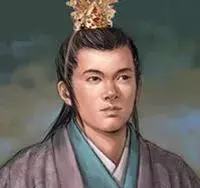Emperor Xiaoming of Northern Wei () was the second son of Emperor Xuanwu Yuan Ke and his mother Empress Dowager Hu of Xuanwu, the ninth emperor of Northern Wei during the Northern and Southern Dynasties.
In 512, yuan xue, who was only three years old, was made crown prince by his father Emperor Xuanwu. In 515, Emperor Xuanwu died, and on the evening of the same day, the then six-year-old crown prince Yuan Xuan (元遚), who was the emperor, was given the era name Xiping (熙平) for Emperor Xiaoming. Empress Gao was honored as empress dowager, and her biological mother Hu Chonghua was made an imperial concubine.
Hu Chonghua, as the empress dowager, actually held the highest political power in Northern Wei.

At the beginning of Empress Dowager Hu's reign, she had a lot of achievements. She went to the court every day to approve the courtiers' recitals, personally decided on major cases, and personally evaluated local officials. Once Empress Dowager Hu had the greatest power without restraint, the dark side of her nature of pursuing luxury was soon exposed.
Empress Dowager Hu revered the Buddha, believing that the Dharma would alleviate sins. After the advent of the dynasty, she spent a huge amount of money to build monasteries and excavate grottoes, and the scale of her construction was the largest in history. For example, the construction of grotto temples in Luoyang Longmen Mountain and Yique Mountain, before and after the employment reached more than 800,000; She built the Yongning Temple next to the imperial palace, one of which is 90 zhang high and the pillar on the tower is 10 zhang high, which can be seen a hundred miles away from the capital.
There are as many as 1,000 monks' rooms in the temple, including one eight-gold Buddha statue, 10 medium gold Buddha statues, and 2 jade Buddha statues. There is a golden vase on the Buddha's brake, and a 30-weight dew plate under the bottle, surrounded by a golden dove. The four windows of the Futu Tower are decorated with gold nails. The high wind and eternal night, Baoduo and Ming, the sonorous sound, the sound of more than 10 miles.
At that time, the number of temples in the country surged to more than 30,000, and there were more than 2 million monks and nuns. In Luoyang alone, there are 1367 monasteries, which have been passed down from the Dharma to the Central Plains, and the pagoda temple is flourishing.
Empress Dowager Hu was also very fond of drinking and feasting, and when she was happy, she often rewarded her cronies with a large amount of money. Once, she rode the Song up the mountain, accompanied by hundreds of people, in order to have fun, ordered her subordinates to open the treasury of the palace, and ordered the princes, concubines, and princesses to grab it at will, and as a result, a large number of silk veils were scattered into private homes. Empress Dowager Hu was extravagant and extravagant, and the dignitaries and nobles competed for luxury and exaggeration.
Wang Yuanyong of Gaoyang had 6,000 male servants and 500 prostitutes, and a meal cost tens of thousands of dollars. Wang Yuanchen and Yuan Yongbifu of Hejian fed the horses with silver troughs and feasted on guests with agate bowls, crystal cups, and red jade pots produced in the Western Regions. King Yuanrong of Zhangwu was so angry that he could not get up for three hundred days.
In addition, Empress Dowager Hu's personal private life was also absurd and unrestrained. King Yuanyi of Qinghe was handsome in appearance, and Empress Dowager Hu summoned him to the harem for this reason, not only fornicating with him, but also entrusting him with great power in government. She also secretly reserved her face, deeply in love with a man Yang Baihua, and feasted and had fun with him.
Emperor Xiaoming of northern Wei gradually became a governor and felt that Empress Dowager Hu's actions were bound to lead the dynasty to ruin, so he was determined to take charge of the state affairs himself. However, Empress Dowager Hu continued to favor the private party, often using the excuse to kill Emperor Xiaoming's close subjects. In 528, Emperor Xiaoming's concubine Pan gave birth to a daughter, but Empress Dowager Hu announced that she had given birth to a prince and pardoned the world as a celebration.
Emperor Xiaoming could not bear it, and Naifa secretly ordered erzhu Rong, the general who was guarding Jinyang, to lead his troops south into Luoyang to coerce Empress Dowager Hu into handing over power. Unexpectedly, the news leaked, Empress Dowager Hu and her cronies poisoned Emperor Xiaoming to death, first announcing to the world that the "crown prince" born by the previous Pan Concubine would succeed to the throne, and because it was recognized, she announced to the world that Yuan Zhao, the son of the three-year-old King of Lintao, would succeed to the throne. When the news came out, the world was shocked and the government and the opposition were indignant.
Empress Dowager Hu sank the Yellow River
Yi Tongsan si and the metropolitan Governor Erzhu Rong took the opportunity to rebel and attack Luoyang in the south. When Empress Dowager Hu saw that the general trend had gone, she cut her hair and became a nun herself, and then entered the Buddhist temple. In April of the first year of Wu Tai, Erzhu Rongbing entered Luoyang, drowned Empress Dowager Hu and The Young Emperor into the Yellow River, and killed more than 2,000 ministers of culture and military affairs, which is the famous "Change of Heyin" in history. Soon after the incident, the Northern Wei Dynasty split into Eastern Wei and Western Wei.
At the age of fifty-eight, he died, and the three kingdoms were the best puppet emperor of the three kingdoms